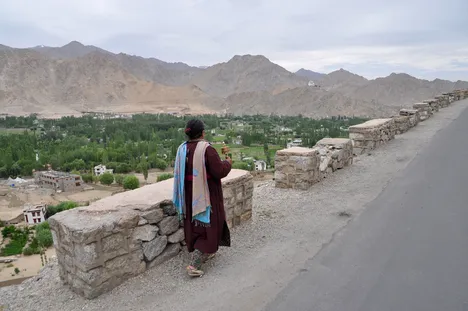Leh Town, Ladakh, Indian Himalaya
Enhancing water, energy and food security through the Nexus approach

With ongoing economic growth, demand for natural resources such as water, energy and food continue to rise worldwide, especially in cities. The result is serious environmental degradation and climate change. Cities in developing and increasingly also in developed economies are already facing serious water-related development challenges. These are expected to intensify with climate change-related water uncertainty and scarcity, augmenting already existing and potential public health risk.
Integrated urban planning approaches, particularly that can leverage on potential synergies of climate change mitigation and adaptation approaches and measures, urgently need to be developed and implemented by 2030 to avert disastrous climatic consequences.
The WEF Nexus approach is one way for cities to devise more sustainable development pathways. Supplying water to cities as well as collecting and treating wastewater takes much energy, and much water is needed to produce energy and food. The approach advocates that planning these sectors in an integrated manner can enhance water, energy and food security and implementation of the United Nations Sustainable Development Goals (SDGs). Water reclamation with integrated resource recovery reuse is a key synergy opportunity for the operationalization of the WEF Nexus approach. To operationalize the WEF Nexus approach, novel governance structures will also be required. However, so far, few examples exist where the WEF Nexus approach with water reclamation and reuse as a key element has been implemented at urban scales. More pilot projects are needed in order to test the viability of this approach.
The aim of the Urban WEF Nexus research group is to study the interaction between the sectors water, energy and food, and other relevant sectors, and devise alternative future urban development scenarios to support development of pilot projects at urban scales. The development of such alternative solutions is embedded in participatory multi-stakeholder co-design processes. The project works at various case study city locations in Asia, Africa and Europe.
For more information, please visit the project documentary Nexus Film (2015): "If not now, when? Planning for the urban Water-Energy-Food Nexus" Duration: 18 minutes Link: https://vimeo.com/142941443
Partners
Municipal Committee of Leh (MCL), Ladakh Ecological Development Group (LEDeG), Bremen Overseas Development Agency (BORDA)
Funding
European Commission, German Research Foundation (DFG), Bavarian State Ministry of the Environment and Consumer Protection (StMUV), Bavarian Environment Agency / Landesamt für Umwelt (LfU), German Federal Ministry of Education and Research (BMBF), TUM Global Incentive Fund (GIF), German Academic Exchange Service (DAAD)
Publications
Paez-Curtidor, N., Gondhalekar, D.* & J.E. Drewes (2021). Application of the Water-Energy-Food Nexus Approach to the Climate-Resilient Water Safety Plan of Leh Town, India. Sustainability 2021,13,10550. https://doi.org/10.3390/su131910550
Gondhalekar, D.* & J.E. Drewes (2021). Infrastructure shaming and consequences for management of urban WEF Security Nexus in China and India. Special Issue "Management of Water-Energy-Food Security Nexus" (L. Swatuk & C. Cash Eds.) Water 2021,13, 267. https://doi.org/10.3390/w13030267
Lahmouri, M., J.E. Drewes & D. Gondhalekar* (2019). Assessment of greenhouse gas emissions of water reclamation with resource recovery options in Leh Town, Ladakh, India. Water 2019, 11, 906; doi:10.3390/w11050906
Gondhalekar, D.* & A. Akhtar (2015). Down the drain or back to the roots? A political ecology of the Water Energy Food Nexus visualized using GIS in Leh Town, Ladakh, India. Projections no. 11: Planning Sustainability in Global Economies, Journal of the MIT Department of Urban Studies and Planning, p.77-97
Akhtar, A. & D. Gondhalekar (2014). Towards an eco-tourism approach: Tourism impacts on water resources in Leh town. Ladakh Studies No. 30, p. 25-37
Mollinga, P.P. & D. Gondhalekar (2014). Finding structure in diversity: A stepwise small-N/medium-N qualitative comparative analysis approach for water resources mgmt. research. Water Alternatives, 02/2014
Gondhalekar, D.*, S. Nussbaum, A. Akhtar, J. Kebschull, P. Keilmann, S. Dawa, P. Namgyal, L. Tsultim, T. Phuntsog, S. Dorje, P. Namgail & T. Mutup (2013). Water-related health risks in rapidly developing towns: integrated GIS-based planning. In Saravanan and Gondhalekar (eds.). Special Issue. Water Supply and Sanitation as “Preventive Medicine”: Challenges in Rapidly Growing Economies. Water Intl. 38(7):902-920
Gondhalekar, D.,* P.P. Mollinga & V.S. Saravanan (2013). Towards Systematic Comparative Water and Health Research. In Saravanan and Gondhalekar (eds.). Water International 38(7):967-976
Saravanan, V.S. & D. Gondhalekar (2013). Water Supply & Sanitation as “Preventive Medicine”: Challenges in Rapidly Growing Economies. In Saravanan & Gondhalekar (eds.). Water Intl. 38(7):867-874
Gondhalekar, D.* (2012). Health impact of drinking polluted water in Darchen Town, Tibet: an urban planning perspective. Intl. Journal of Sustainable Water and Environmental Systems Vol. 4(1), pp. 59-66